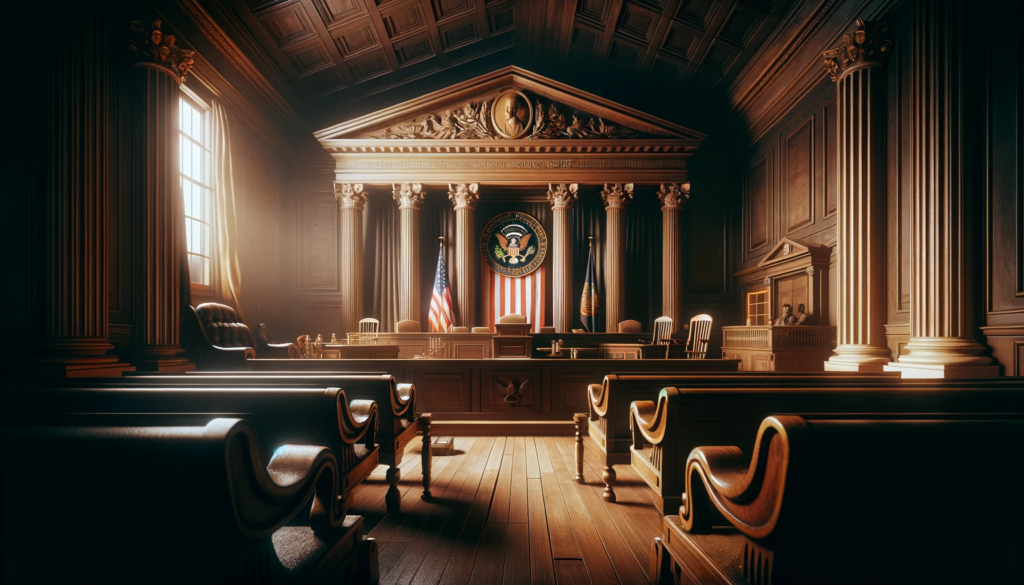
John Jay stands as a pivotal figure in the tapestry of American history, embodying the multifaceted roles of statesman, diplomat, and jurist with unparalleled distinction. His legacy, as the first Chief Justice of the United States, a contributor to the American Revolution, and a key figure in the negotiation of critical treaties, underscores a career dedicated to the establishment and strengthening of a nascent nation. Jay’s journey from a young New York lawyer to a leading architect of American policy, both domestic and foreign, illustrates a life of intellectual rigor, principled diplomacy, and unwavering commitment to justice. This blog post aims to explore Jay’s vast contributions, delving into his early life, revolutionary endeavors, instrumental role in the framing of the U.S. Constitution, and tenure in the early judiciary. Moreover, it will highlight his diplomatic triumphs, such as his critical role in the Treaty of Paris and the Jay Treaty, alongside insights into his personal beliefs, particularly his stance on abolitionism. Through this exploration, we will uncover the enduring legacy of a man whose work laid the foundational stones of American democracy and governance.
Early Life and Education
Born on December 12, 1745, in New York City, John Jay emerged from a lineage rich in Huguenot and Dutch heritage, his family having been prominent in commerce and public service. Jay’s early years were marked by the influence of a prosperous and socially prominent family, setting a backdrop of expectation and opportunity. His education began under the tutelage of a private instructor, reflecting the customs of the colonial elite, before he transitioned to King’s College (now Columbia University) at the age of 14.
At King’s College, Jay was immersed in a classical education, studying philosophy, mathematics, and law. This period was critical in shaping his intellectual pursuits and his early leanings towards law and politics. Graduating in 1764, Jay chose to pursue law, an avenue that not only promised a respectable career but also offered a platform for engaging in the burgeoning political discourse of the colonies.
The intersection of law and politics became increasingly pronounced as Jay entered legal practice in 1768. His marriage in 1774 to Sarah Livingston, the daughter of New Jersey’s Governor William Livingston, further intertwined his personal and professional life with the colonial elite, poised at the brink of revolution. It was during these formative years that Jay’s legal acumen and his passion for colonial rights began to surface, setting the stage for his indelible contributions to the American Revolution and the foundational years of the United States.
Jay’s early life and education not only equipped him with the intellectual and legal prowess needed for the challenges ahead but also instilled in him a profound sense of duty towards his fellow colonists and an unwavering commitment to justice and liberty.
Role in the American Revolution
John Jay’s transition from a successful lawyer to a revolutionary leader was spurred by the escalating tensions between the American colonies and Great Britain. His political career began in earnest with his election to the New York Committee of Correspondence in 1774, where he played a crucial role in coordinating resistance against British policies. Jay’s eloquence and firm stance on colonial rights quickly propelled him to the forefront of New York’s political scene, leading to his election to the Continental Congress the following year.
As a member of the Continental Congress, Jay emerged as a staunch advocate for independence, contributing to the development of policies and strategies that would define the revolutionary movement. Although he was not a signatory of the Declaration of Independence, his work on drafting the New York State Constitution and his leadership in the New York Provincial Congress underscored his commitment to the cause of liberty.
Jay’s contributions to the American Revolution extended beyond the confines of domestic politics. In 1779, he was appointed as minister to Spain, tasked with the formidable challenge of securing financial aid and diplomatic recognition for the fledgling United States. Despite facing significant obstacles, Jay’s negotiations laid the groundwork for vital support from Spain, a key ally in the fight against British dominance.
The pinnacle of Jay’s revolutionary career, however, was his role as one of the negotiators of the Treaty of Paris in 1783. Alongside Benjamin Franklin and John Adams, Jay’s diplomatic skill was instrumental in securing favorable terms for the United States, marking the official end of the Revolutionary War and the recognition of American independence by Great Britain. Jay’s insistence on British recognition of American sovereignty and his strategic navigation of the complex European political landscape were pivotal in achieving a treaty that far exceeded the expectations of many of his contemporaries.
Through his legislative and diplomatic efforts, John Jay not only contributed significantly to the success of the American Revolution but also helped shape the emerging identity and international stature of the United States. His work during this tumultuous period laid the foundations for his later contributions to the formation of the U.S. Constitution and the judiciary, further cementing his legacy as a key architect of American democracy.
Contributions to the U.S. Constitution and Judiciary
Following the American Revolution, the young nation faced a myriad of challenges, not least of which was the creation of a stable, effective government. The Articles of Confederation, the first governing document of the United States, proved inadequate, prompting the need for a stronger federal structure. John Jay, having witnessed firsthand the weaknesses of the Confederation, became a vocal advocate for a new constitution that would provide the national government with greater authority and efficacy.

Jay’s contributions to this pivotal moment in American history were multifaceted. Though not a delegate to the Constitutional Convention of 1787, his influence was felt through a series of essays he co-authored with Alexander Hamilton and James Madison, known today as the Federalist Papers. These essays, particularly Jay’s Nos. 2, 3, 4, and 5, argued convincingly for the ratification of the Constitution, focusing on the importance of unity and a strong national government in conducting foreign policy and defending against external threats. Jay’s clear, persuasive writing helped sway public opinion in favor of the Constitution, facilitating its ratification and the establishment of the new federal government.
In 1789, Jay’s profound impact on the nascent United States continued as President George Washington appointed him the first Chief Justice of the United States, a role in which Jay would further shape the American legal landscape. During his tenure on the Supreme Court, Jay presided over landmark cases that helped define the balance of power between the federal government and the states, as well as the judiciary’s role within the federal system. Although the Court heard few cases during Jay’s tenure, his decisions in cases like Chisholm v. Georgia (1793) played a crucial role in evolving the doctrine of federalism and the authority of federal courts.
Jay’s leadership as Chief Justice also involved administrative duties, such as organizing the new federal judiciary and establishing protocols that would endure within the American legal system. Despite his relatively short tenure, ending in 1795 when he resigned to become Governor of New York, Jay’s legacy as Chief Justice laid the groundwork for the Supreme Court’s central role in American governance and legal interpretation.
Diplomatic Achievements: Treaty of Paris and Jay Treaty
John Jay’s diplomatic acumen was not only instrumental in securing American independence but also in shaping the young nation’s foreign policy. His role in negotiating the Treaty of Paris in 1783 has been well documented, but equally significant was his involvement in the Jay Treaty with Great Britain in 1794. At a time when tensions between the United States and Britain threatened to erupt into war, Jay was sent to London to negotiate a resolution to outstanding issues from the Revolutionary War and to avert further conflict.
The Jay Treaty, while controversial, achieved several important objectives for the United States. It secured compensation for American merchants whose goods had been seized by British ships, established a commission to resolve boundary disputes, and facilitated the withdrawal of British troops from forts in the American West. Although criticized by some for its concessions to British interests, the treaty helped prevent war with Britain and maintained a crucial peace during a formative period in American history.
Jay’s efforts in securing the treaty underscored his commitment to pragmatic diplomacy and his skill in navigating complex international dynamics. Despite the political fallout, which impacted Jay’s own popularity and future political career, his negotiation of the Jay Treaty demonstrated a foresighted approach to foreign policy that prioritized national stability and growth.
Personal Beliefs and Abolitionism
Beyond his public service, John Jay was a man of deep personal convictions, particularly evident in his stance on slavery. A committed abolitionist, Jay was an early and vocal opponent of the slave trade and slavery in the United States. His efforts in this arena included serving as the president of the New York Manumission Society, an organization dedicated to the abolition of slavery and the protection of African Americans’ rights.

Under Jay’s leadership, the Manumission Society advocated for the gradual emancipation of slaves in New York, culminating in the state’s Gradual Emancipation Act of 1799, which set a path toward freedom for many enslaved individuals. Although the law fell short of immediate abolition, it represented a significant step forward and reflected Jay’s pragmatic approach to achieving social change within the constraints of his time.
Jay’s personal beliefs and actions in the realm of abolitionism offer a nuanced view of his character and ideals. Committed to justice and human dignity, he navigated the complex moral and social landscape of his era to make tangible contributions toward the abolition of slavery in America.
Legacy and Impact on American History
The breadth of John Jay’s contributions to the American Revolution, the formation of the U.S. Constitution, the judiciary, and his diplomatic achievements, coupled with his personal commitment to abolitionism, mark him as one of the most influential figures in American history. Jay’s legacy is characterized by his unwavering dedication to building a strong, just, and prosperous nation, guided by principles of liberty and justice for all.
His role in negotiating peace and forging national identity during the fragile early years of the United States underscores the critical importance of diplomacy and vision in shaping the trajectory of nations. As the first Chief Justice, Jay’s contributions to the legal framework of the United States continue to resonate, underscoring the importance of an independent judiciary in maintaining the balance of power and protecting constitutional rights.
In reflecting on John Jay’s impact, it is clear that his vision, intellect, and moral compass played a crucial role in the foundational years of the United States. His efforts to reconcile the ideals of liberty with the complex realities of governance and international relations offer enduring lessons on leadership, diplomacy, and the pursuit of justice.
Conclusion
John Jay’s life and legacy offer a compelling narrative of commitment to public service, visionary leadership, and the relentless pursuit of justice. As a founding father, diplomat, jurist, and abolitionist, Jay’s contributions spanned the critical domains of American independence, governance, law, and social reform. His work laid essential foundations for the United States, shaping the nation’s identity, legal system, and foreign policy in ways that continue to influence American society and governance.
Reflecting on Jay’s multifaceted legacy provides valuable insights into the complexities of nation-building and the enduring relevance of principled leadership in navigating the challenges of governance and diplomacy. As we continue to grapple with issues of justice, liberty, and national identity, John Jay’s life reminds us of the enduring impact one individual’s commitment to principle and country can have on the course of history.
John Jay’s contributions to the United States are a testament to the power of intellect, integrity, and a profound commitment to the ideals of democracy. As we look back on his enduring legacy, we are reminded of the foundational principles that continue to guide the nation towards a more just and equitable future.
Posts
- Exploring the Rich Tapestry of American History, Culture, and Trivia (15 December 2023)
- Welcome to American Facts 101: Your Ultimate Source for Exploring American History, Culture, and Trivia (15 December 2023)
- Uncovering the Hidden Gems of the USA (15 December 2023)
- Uncovering the Untold Stories of the USA (15 December 2023)
- Exploring the Rich Tapestry of American History and Culture (15 December 2023)
- Revealing America’s Saga: The Untold Chronicles of a Nation (15 December 2023)
- Charles Carroll: The Wealthiest Revolutionary and Fearless Freedom Advocate (15 December 2023)
- Revealing The Bill of Rights: Fortifying Our Precious Liberties! (22 December 2023)
- Benjamin Franklin Exposed: Maverick Creator, Shrewd Diplomat, Timeless Visionary (22 December 2023)
- Revealing Alexander Hamilton: The Visionary Maverick Who Sculpted America’s Future (28 December 2023)
- Jefferson’s America: How a Founding Father Forged a Nation’s Destiny (30 December 2023)
- Father of the Nation: How John Adams Shaped America’s Destiny (1 January 2024)
- Forgotten Trailblazers: Revealing the Covert Champions of the Revolution (3 January 2024)
- America’s Gilded Epoch: A Tale of Swift and Monumental Change (5 January 2024)
- Unveiling the Declaration: A Beacon of Liberty and Hope (6 January 2024)
- The Great Depression: Resilience in the Face of Adversity (11 January 2024)
- Revolutionizing Brilliance: The Daring Leap of America’s Industrial Breakthrough (14 January 2024)
- Navigating the Rugged Terrain of Civil Rights Victory (18 January 2024)
- A Decade of Revolutionary Transformation and Lavish Exuberance (19 January 2024)
- Space Odyssey: America’s Bold Soar into the Celestial Frontier (21 January 2024)
- The Oregon Trail: Pioneers and Perils of the Westward Expansion (26 January 2024)
- The Louisiana Purchase: A Colossal Expansion of America’s Realm (27 January 2024)
- The Profound Influence of Immigration on the USA (28 January 2024)
- The Gold Rush: Dreams and Hardships in the West (9 February 2024)
- The Forbidden Decade: America’s Fervent Quest for Virtue (28 February 2024)
- Swinging Rhythms, Daring Flappers: A New Vision of the American Dream (1 March 2024)
- The Salem Witch Trials: Dread and Justice in Early American Colonies (3 March 2024)
- The Echoes of Liberty – Unveiling Federalist No. 1 (23 March 2024)
- Edward Rutledge: A Vanguard Spirit of Liberty’s Dawn (23 March 2024)
- John Jay: Pioneering Crusader for American Justice (29 March 2024)
- Revolt & Reason: The Untold Power of ‘Cato 1 (1 April 2024)
- Hidden Virtues: George Washington’s Secret Acts of Kindness (9 April 2024)
- How Jefferson’s Love for Meteorology Shaped the White House (9 April 2024)
- Echoes of the Night: Secrets of Navajo Skinwalkers Unveiled (10 April 2024)
- Ghost Ships of the Great Lakes (10 April 2024)
- Lincoln’s Grit: Unveiling the Wrestler-President (11 April 2024)
- Unity or Peril? The Covert Threat of Foreign Interference (14 April 2024)
- Roosevelt’s Midnight Quest: Secrets at the Smithsonian (14 April 2024)
- Revolutionary Ripples: Adams’ Potomac Epiphanies (14 April 2024)
- Washington’s Ale of Liberty: A Pioneering Patriotic Brew (14 April 2024)
- Visionary Rebellion: The Architect of U.S. Freedom (20 April 2024)
- Revealing the Legacy: The Enigma of Anti-Federalist Ideals (21 June 2024)
Categories
Tags
- Bill of Rights
- American history
- governance
- John Adams
- Founding Fathers
- American Revolution
- unsung heroes
- independence
- Great Depression
- resilience
- Gilded Age
- social changes
- Declaration of Independence
- American culture
- national identity
- economic hardship
- American Industrial Revolution
- technological advancements
- key inventions
- industrial growth
- Civil Rights Movement
- racial discrimination
- equality
- 1920s
- Roaring Twenties
- economic boom
- Space Race
- United States
- Soviet Union
- Oregon Trail
- westward expansion
- Louisiana Purchase
- immigration
- diverse cultures
- Gold Rush
- American West
- mining towns
